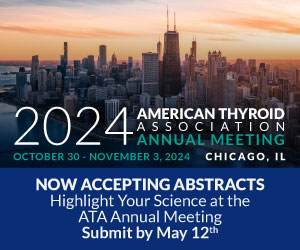Falls Church, Virginia. Sep. 21, 2012 –Although age 45 is used to establish staging in well-differentiated papillary thyroid cancer using the American Joint Committee on Cancer and the International Union Against Cancer TNM Classification of Malignant Tumors (TNM) staging system, a new study presented at the 82nd Annual Meeting of the American Thyroid Association (ATA) in Québec City, Québec, Canada, suggests that > 65 may be a more accurate age marker for prognosis.
“While age at diagnosis appears to play a role in papillary thyroid cancer outcomes, new data suggest that a more appropriate age marker for prognosis is > 65 years,” said Elizabeth Pearce, MD, of the Boston Medical Center and Program Co-Chair of the ATA annual meeting. “Use of this older age marker would result in down-staging of many patients, reflecting a more favorable prognosis that could avoid potentially unnecessary therapies and allay patients’ fears about their longevity.”
A review of the literature to determine the origin of this age marker appears to date back to an article by Byar, et al., published in European Journal of Cancer in 1979, that was underpowered and not specific to well-differentiated thyroid cancer. In addition, empiric clinical observations often suggest that patients aged 45 to 64 years appear to have similar long-term outcomes when compared to patients < 45 years of age.
A team of researchers led by Lindsay Bischoff, MD, of the Thomas Jefferson University Hospital in Philadelphia, Pa., thus conducted a study to determine the accuracy of age 45 as a prognostic cut-off. They performed a search of the Surveillance, Epidemiology, and End Result (SEER) database to obtain data for histology-confirmed papillary thyroid cancer. Data were stratified in 5-year categories by age at diagnosis from 20 to 84 years old, with patients 85 years of age and older categorized together. All stages, race/ethnicity groups, and sexes were included. A total of 53, 581 patients were identified with histologically confirmed papillary thyroid cancers.
Researchers found that the overall 5-year survival remained above 90% for all age groups under 65 years. It was not until age 65 years and older that patients had a progressively less favorable prognosis with each advancing age group.
About the ATA Annual Meeting
The 82nd Annual Meeting of the American Thyroid Association is held Sept.19-23, in Québec City, Québec, Canada. This four-day creative and innovative scientific program, chaired by Elizabeth Pearce, MD, Boston Medical Center, and Douglas Forrest, PhD, National Institute of Diabetes and Digestive and Kidney Diseases, carefully balances clinical and basic science sessions on the latest advances in thyroidology. The ATA meeting is designed to offer continuing education for endocrinologists, internists, surgeons, basic scientists, nuclear medicine scientists, pathologists, endocrine fellows and nurses, physician assistants and other health care professionals. Visit www.thyroid.org for more information.
About the ATA
The American Thyroid Association (ATA) is the leading worldwide organization dedicated to the advancement, understanding, prevention, diagnosis and treatment of thyroid disorders and thyroid cancer. ATA is an international individual membership organization with over 1,600 members from 43 countries around the world. Celebrating its 89th anniversary, ATA delivers its mission through several key endeavors: the publication of highly regarded monthly journals, THYROID, Clinical Thyroidology and Clinical Thyroidology for Patients; annual scientific meetings; biennial clinical and research symposia; research grant programs for young investigators, support of online professional, public and patient educational programs through www.thyroid.org; and the development of guidelines for clinical management of thyroid disease. Visit www.thyroid.org for more information.
Media Contact
Bobbi Smith
Executive Director
of the American Thyroid Association
Email: thyroid@thyroid.org
# # #



